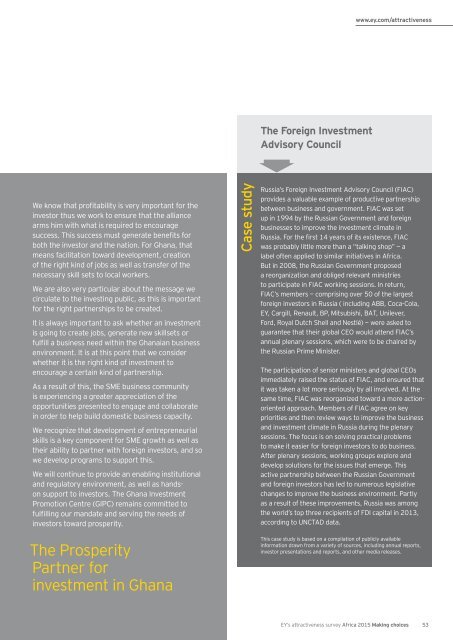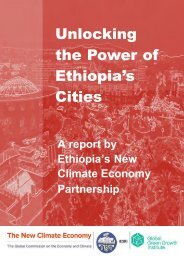EY-africa-attractiveness-survey-june-2015-final
EY-africa-attractiveness-survey-june-2015-final
EY-africa-attractiveness-survey-june-2015-final
Create successful ePaper yourself
Turn your PDF publications into a flip-book with our unique Google optimized e-Paper software.
www.ey.com/<strong>attractiveness</strong>The Foreign InvestmentAdvisory CouncilWe know that profitability is very important for theinvestor thus we work to ensure that the alliancearms him with what is required to encouragesuccess. This success must generate benefits forboth the investor and the nation. For Ghana, thatmeans facilitation toward development, creationof the right kind of jobs as well as transfer of thenecessary skill sets to local workers.We are also very particular about the message wecirculate to the investing public, as this is importantfor the right partnerships to be created.It is always important to ask whether an investmentis going to create jobs, generate new skillsets orfulfill a business need within the Ghanaian businessenvironment. It is at this point that we considerwhether it is the right kind of investment toencourage a certain kind of partnership.As a result of this, the SME business communityis experiencing a greater appreciation of theopportunities presented to engage and collaboratein order to help build domestic business capacity.We recognize that development of entrepreneurialskills is a key component for SME growth as well astheir ability to partner with foreign investors, and sowe develop programs to support this.We will continue to provide an enabling institutionaland regulatory environment, as well as handsonsupport to investors. The Ghana InvestmentPromotion Centre (GIPC) remains committed tofulfilling our mandate and serving the needs ofinvestors toward prosperity.The ProsperityPartner forinvestment in GhanaCase studyRussia’s Foreign Investment Advisory Council (FIAC)provides a valuable example of productive partnershipbetween business and government. FIAC was setup in 1994 by the Russian Government and foreignbusinesses to improve the investment climate inRussia. For the first 14 years of its existence, FIACwas probably little more than a “talking shop” — alabel often applied to similar initiatives in Africa.But in 2008, the Russian Government proposeda reorganization and obliged relevant ministriesto participate in FIAC working sessions. In return,FIAC’s members — comprising over 50 of the largestforeign investors in Russia ( including ABB, Coca-Cola,<strong>EY</strong>, Cargill, Renault, BP, Mitsubishi, BAT, Unilever,Ford, Royal Dutch Shell and Nestlé) — were asked toguarantee that their global CEO would attend FIAC’sannual plenary sessions, which were to be chaired bythe Russian Prime Minister.The participation of senior ministers and global CEOsimmediately raised the status of FIAC, and ensured thatit was taken a lot more seriously by all involved. At thesame time, FIAC was reorganized toward a more actionorientedapproach. Members of FIAC agree on keypriorities and then review ways to improve the businessand investment climate in Russia during the plenarysessions. The focus is on solving practical problemsto make it easier for foreign investors to do business.After plenary sessions, working groups explore anddevelop solutions for the issues that emerge. Thisactive partnership between the Russian Governmentand foreign investors has led to numerous legislativechanges to improve the business environment. Partlyas a result of these improvements, Russia was amongthe world’s top three recipients of FDI capital in 2013,according to UNCTAD data.This case study is based on a compilation of publicly availableinformation drawn from a variety of sources, including annual reports,investor presentations and reports, and other media releases.<strong>EY</strong>’s <strong>attractiveness</strong> <strong>survey</strong> Africa <strong>2015</strong> Making choices53



